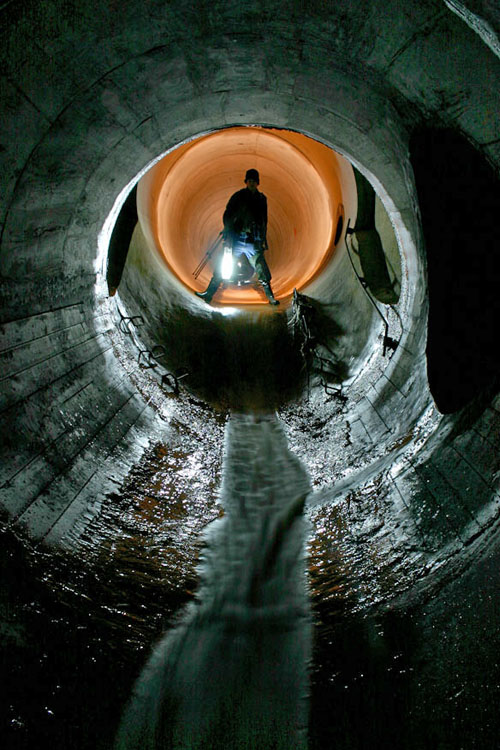BLDGBLOG Interviews...
For a variety of reasons I thought I'd post a quick round-up of the interviews I've done for BLDGBLOG – and announce, in the process, that more interviews are forthcoming, and I'm excited.
 [Image: Rome's Colosseum].
[Image: Rome's Colosseum].
In less than a week, for instance, I'll be posting a long, two-part interview with Cambridge University classicist and general editor of the Wonders of the World series, Mary Beard. In that interview, she discusses everything from Mussolini and the politics of urban archaeology to Cape Canaveral, the Taj Mahal, and the recent film 300.That'll be up by Monday morning. That interview is now up: Part One and Part Two.
Soon thereafter I hope to publish interviews with sci-fi novelist Kim Stanley Robinson – about climate change, sustainability, and the literature of the future – as well as with DJ /rupture (who spoke at Postopolis!) about sound, migration, cities, and the acoustic ins and outs of sonic borderlands.
 [Image: A "short drop" in Toronto's Viceroy Drain; photo by Michael Cook].
[Image: A "short drop" in Toronto's Viceroy Drain; photo by Michael Cook].
In any case, perhaps you're new to the site and don't even know that I've been interviewing anyone, or maybe you just never read the interviews in the first place because they're too long – or perhaps you did read the interviews and you've just been dying for me to refer to them again...
So here's a quick list of links to old interviews:
Watch out for the Mary Beard interview next week – and many more to come.
 [Image: Rome's Colosseum].
[Image: Rome's Colosseum].In less than a week, for instance, I'll be posting a long, two-part interview with Cambridge University classicist and general editor of the Wonders of the World series, Mary Beard. In that interview, she discusses everything from Mussolini and the politics of urban archaeology to Cape Canaveral, the Taj Mahal, and the recent film 300.
Soon thereafter I hope to publish interviews with sci-fi novelist Kim Stanley Robinson – about climate change, sustainability, and the literature of the future – as well as with DJ /rupture (who spoke at Postopolis!) about sound, migration, cities, and the acoustic ins and outs of sonic borderlands.
 [Image: A "short drop" in Toronto's Viceroy Drain; photo by Michael Cook].
[Image: A "short drop" in Toronto's Viceroy Drain; photo by Michael Cook].In any case, perhaps you're new to the site and don't even know that I've been interviewing anyone, or maybe you just never read the interviews in the first place because they're too long – or perhaps you did read the interviews and you've just been dying for me to refer to them again...
So here's a quick list of links to old interviews:
- • Drains of Canada: An Interview with Michael Cook Last week, BLDGBLOG posted an interview with urban explorer Michael Cook. Cook has extensively documented and photographed the concrete knots and tubes of Canada's municipal drains and hydroelectric stations. He discusses organized hydrology and the environmental impact of urban infrastructure, as well as the myths, waterproof boots, and respiratory infections that accompany his explorations.
• The possibility of secret passageways: An Interview with Patrick McGrath. Novelist Patrick McGrath talks to BLDGBLOG about the landscapes, buildings, weather, madness, and mold associated with Gothic fiction, from Mary Shelley's polar void to the swamps of Honduras. McGrath mentions dinosaur skeletons, psychiatric institutions, the desert, David Lynch, and his own forthcoming novel, Trauma.
• BLDGBLOG has also interviewed the editorial team behind Volume magazine, including Jeffrey Inaba and Ole Bouman, head of the Netherlands Architecture Institute:
- • Of Cars, Dogs, Golf, and Bad Feng Shui: An Interview with Jeffrey Inaba
• Agitation, Power, Space: An Interview with Ole Bouman
• The Heliocentric Pantheon: An Interview with Walter Murch. Academy Award-winning film editor and sound designer Walter Murch talks to BLDGBLOG about Nicolaus Copernicus and the heliocentric structure of Rome's Pantheon. I ask him about sound and the city, urban surveillance, and the architecture of solar alignment.
• Architecture and Climate Change: An Interview with Ed Mazria. Architect Ed Mazria explains the basics of his Architecture 2030 organization, elucidating the connections between architecture, the construction industry, and global climate change.
• War/Photography: An Interview with Simon Norfolk. In one of my favorite interviews yet, British war photographer Simon Norfolk explains what exactly makes him a photographer of war, capturing battlefields in their extended sense: the supercomputers that model nuclear warheads and the remote imperial radar installations sweeping empty space for signs of enemy aircraft.
• The Lonely Planet Guide to Micronations: An Interview with Simon Sellars. Simon Sellars, author and overseer of the excellent site Ballardian, talks to BLDGBLOG about the recent travel guide he co-edited for Lonely Planet: a field guide to micronations.
• Science Fiction and the City: An Interview with Jeff VanderMeer. Dark fantasist Jeff VanderMeer discusses the imaginative architectures of science fiction, via coral reefs, the pedestrianized city cores of Europe, a childhood spent on tropical islands, the vaults of York Minster, and a cathedral made from medical devices.
• The Visionary State: An Interview with Erik Davis. Author Erik Davis tells BLDGBLOG about his recent book, The Visionary State, a long look at the spiritual geography of California, from Philip K. Dick's final apartment to the intersections of greater Los Angeles.
• Interview with Mike Davis: Part 1 and Part 2. In BLDGBLOG's first interview, sociologist Mike Davis talks about all kinds of things: urban warfare, the Pentagon, the films of Ridley Scott, the RAND Corporation, global poverty, avian flu, and his widely discussed book Planet of Slums.
Watch out for the Mary Beard interview next week – and many more to come.





Comments are moderated.
If it's not spam, it will appear here shortly!
... and also a great service for readers who've spend summer vacation away from the net - my eyes are now itching to read about the pssibility of secret passageways... mmmm ...
thank you
No problem, Adam. Welcome back - and enjoy the interview!
Post a Comment